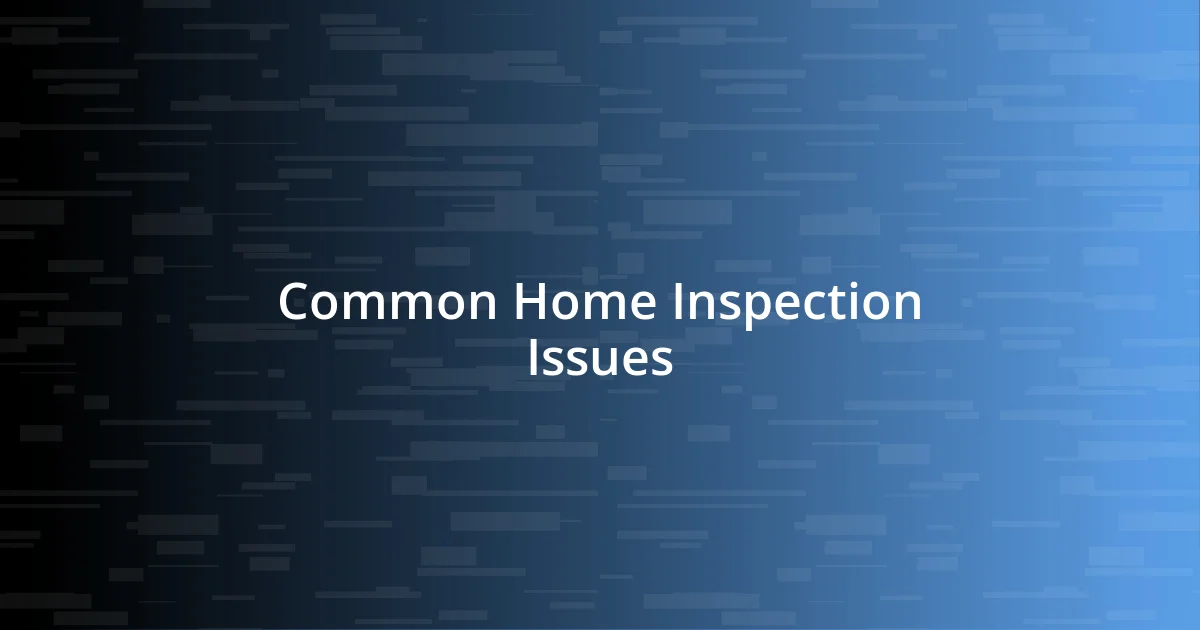Key takeaways:
- Home inspections are vital for identifying hidden issues in a property, such as mold, outdated systems, and structural problems, which can save buyers from costly mistakes.
- Preparation and proactive strategies, like researching property history and looking for red flags, can help buyers uncover potential issues before inspections take place.
- Effective negotiation with sellers regarding repairs can turn unexpected findings into collaborative opportunities, emphasizing communication and understanding to reach a mutually beneficial outcome.

Understanding Home Inspection Basics
Home inspections are essential for understanding the condition of a property before committing to a purchase. I remember walking through a house I was considering buying, and the inspector pointed out things I hadn’t noticed, like the sloping floors and older plumbing. It made me realize how crucial it is to have a knowledgeable professional unveil what could be hidden beneath the surface.
You might wonder, what exactly does a home inspector do? Their job is to assess the major systems of the home, including the roof, foundation, plumbing, and electrical systems. The first time I witnessed this firsthand, it felt a bit overwhelming. Did I really need to worry about every small detail? Over time, it became clear that this thorough evaluation not only saved me money but also gave me peace of mind.
Understanding what inspectors look for can help demystify the process. They perform a detailed examination and provide a report that highlights any potential issues or code violations. I recall feeling anxious over a property I loved, but the inspection revealed a significant mold issue in the basement. It was hard to digest at first, but that unexpected revelation ultimately protected me from a costly mistake. How would you feel if your dream home turned out to have hidden dangers?

Common Home Inspection Issues
When going through a home inspection, I found that a few issues consistently pop up across different homes. One common surprise was improper grading around the foundation. I remember being taken aback when an inspector pointed out that the soil sloped toward the house, increasing the risk of water intrusion. It’s a simple concept, but one I hadn’t considered until it was laid out before me.
Another frequent problem involves outdated electrical systems. During one inspection, the inspector flagged several ungrounded outlets, which is a safety hazard that I had no idea existed. I can still recall my heart sinking when I realized how much electrical rewiring could potentially cost. This made me appreciate how crucial it is to prioritize safety in a home, even if it requires some investment upfront.
Lastly, I’ve come across HVAC (Heating, Ventilation, and Air Conditioning) concerns during inspections. I vividly remember the chilly autumn day an inspector revealed that the furnace was nearing the end of its lifespan. I had initially been so enchanted by the grandeur of the living room that I’d overlooked the old radiators. This taught me a valuable lesson: even the most appealing homes can harbor significant issues beneath the charm.
| Common Issues | Implications |
|---|---|
| Improper Grading | Risk of water damage |
| Outdated Electrical Systems | Safety hazards, costly rewiring |
| Old HVAC Systems | Potential heating/cooling failures |

Preparing for Hidden Problems
Preparing for hidden problems requires a proactive mindset. I’ve learned to adopt a few practical strategies to help surface potential issues before the inspection. For instance, before I even stepped into a property, I started walking around the exterior, looking for obvious red flags like cracks in the foundation or peeling paint that could hint at underlying moisture problems. Each detail matters, and this approach made me feel more in control as a buyer.
Here are some tips that worked for me in preparing for hidden problems:
- Research the Property History: I always dive into past repairs and renovations. You’d be surprised at what could have been glossed over by previous owners.
- Observe the Neighborhood: Sometimes, the local area can signal potential problems, like homes with a history of flooding.
- Keep an Eye Out for Red Flags: Things like sagging roofs or damp spots can indicate serious hidden issues. I remember spotting a damp area and it saved me from a potential mold disaster.
- Ask Specific Questions During Walk-Throughs: I’ve learned that directly asking sellers about repairs or issues can provide insights that aren’t always documented.
- Consider a Pre-Inspection: Before making an offer, I often recommend getting a preliminary inspection. It’s an extra step, but it’s worth it for peace of mind.
Every little effort goes a long way in preparing for the unexpected during home inspections. I wish I had known the value of these tips sooner; they would have saved me from not just heartache, but also from the financial strain that hiding problems can impose.

Strategies for Unexpected Findings
When unexpected findings arise during a home inspection, my first strategy is to stay calm and analyze the situation. I recall the moment an inspector informed me of a significant plumbing issue in the basement; my initial reaction was panic. However, I took a deep breath and asked the inspector for specifics. This not only helped me grasp the issue but also provided insight into potential solutions and costs. Having a clear understanding of what I was dealing with transformed my anxiety into actionable knowledge.
Next, I’ve found that negotiating repairs or concessions can be a huge advantage. Once, after discovering an old roof with some damage, instead of withdrawing my offer, I approached the seller about addressing the repairs. This dialogue opened doors I hadn’t considered, and in the end, we reached an agreement that benefited both parties. Isn’t it amazing how open communication can turn a stressful surprise into an opportunity for collaboration?
Lastly, always remember to lean on your network for support. When I faced a massive electrical issue, I called a trusted electrician friend to evaluate the situation. His assessment not only brought peace of mind but also provided a realistic perspective on costs and repairs. I learned that having a reliable network can guide you through unexpected challenges with confidence. Have you thought about who you could reach out to during times like this? It’s incredibly reassuring to have experienced voices to lean on.

Negotiating Repairs with Sellers
Negotiating repairs with sellers can initially feel awkward, but it’s crucial to put your emotions aside and focus on the facts. I remember feeling hesitant when I discovered a significant leak in the attic during my home inspection. The key was to present the finding calmly, highlighting both the problem and the potential expenses involved. Asking for a credit instead of repair can be a smart move, as it allows you to choose how to fix the issue once you own the home.
Communication is everything in these negotiations. When I faced a situation where the seller was resistant to accepting the need for repairs, I made a point to put myself in their shoes. After sharing my concerns about safety and potential long-term damage, I noticed a shift in their attitude. It’s interesting how humanizing the conversation can encourage sellers to consider your perspective more seriously. Have you thought about how you can convey your feelings without coming across as confrontational?
I’ve learned that it’s all about finding common ground. During one negotiation, the seller and I discussed alternatives, including adjusting the offer price to account for the repairs instead of having them complete the work. This not only made it easier for us both but also fostered a sense of collaboration rather than conflict. Reflecting on that experience, I realize that successful negotiations stem from viewing the process as a partnership rather than an ultimatum. Isn’t it empowering to approach negotiations with that mindset?

Learning from the Experience
Learning from unexpected home inspection surprises can profoundly shape how we approach future situations. I remember my first home purchase like it was yesterday. After confronting multiple issues during the inspection, I realized that each surprise taught me something invaluable about prioritizing home maintenance. Moving forward, I made it a habit to keep a punch list of minor repairs, which alleviated some of the stress down the line. Have you ever considered how proactive measures can prevent future headaches?
The emotional rollercoaster of home inspections has also made me appreciate the importance of resilience. There were moments when the news about structural concerns felt like the sky was falling. Yet, I quickly learned that challenges could foster a growth mindset. Each surprise became an opportunity to educate myself, whether it was plumbing nuances or roofing essentials. I often wonder how many homeowners miss out on these learning moments simply by feeling overwhelmed—have you ever found a hidden lesson in an unexpected setback?
Lastly, I’ve grown to understand the value of documentation during these inspections. My first inspection didn’t just unveil issues; it inspired a habit of documenting everything—the inspector’s comments, repair estimates, even photographs. This practice turned out to be tremendously helpful when I sought future repairs or renovations. It made me feel empowered, knowing I had a record of my home’s history. How about you? Have you thought about how a simple notebook could turn surprises into informed decisions?














